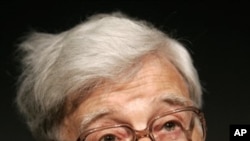The Nobel prize for medicine was awarded to the British scientist who pioneered in-vitro fertilization, a procedure that has helped in the conception and birth of four million people around the world since the first test-tube baby Louise Brown in 1978.
The 85-year-old winner, a Manchester-born physiologist, received the prize in an announcement Monday by the Nobel Assembly's Göran Hansson at the Karolinska Institute in Stockholm. "The Nobel Assembly at Karolinska Institute has today decided to award the Nobel Prize in physiology or medicine 2010 to Robert Edwards for the development of in-vitro fertilization," Hansson said.
Edwards started working on in-vitro fertilization as early as the 1950s. He developed the technique, in which eggs are removed from a woman, fertilized outside her body and then implanted into the womb, together with British surgeon Patrick Steptoe, who died in 1988.
Watch Vidushi Sinha's Companion TV Report
In July 1978, Louise Brown in Britain became the first baby born through the groundbreaking procedure. Since her birth, some four million children have been born worldwide as a result of the procedure.
The work by Edwards and Steptoe stirred an ethical debate, with the Vatican, other religious leaders and some scientists demanding the project be stopped.
The Vatican is opposed to IVF because it involves separating conception from the "conjugal act," sexual intercourse between a husband and wife, and often results in the destruction of eggs that are taken from a woman but not used.
The controversy over IVF continues with debate now centering on who should be able to use the technology. Some experts have questioned whether an age limit should be set on would-be parents, whether women and men who donate their eggs and sperm should be paid, and if gay couples should be eligible.
In France lesbians are not allowed to use donor sperm. In Britain, women cannot be paid more than $384.00 for donating their eggs. Germany and Italy both forbid the freezing of embryos.
After the announcement, Christer Höög, a member of the Nobel medicine prize committee alluded, to the decades-old controversy. "It is a safe and effective therapy. It is regulated through strict ethical guidelines and long-term studies have established that IVF children are as healthy as other children," Höög said.
The medicine award was the first of the 2010 Nobel prizes to be announced. It will be followed by physics on Tuesday, chemistry on Wednesday, literature on Thursday, the Nobel Peace Prize on Friday and economics on Monday Oct. 11.




